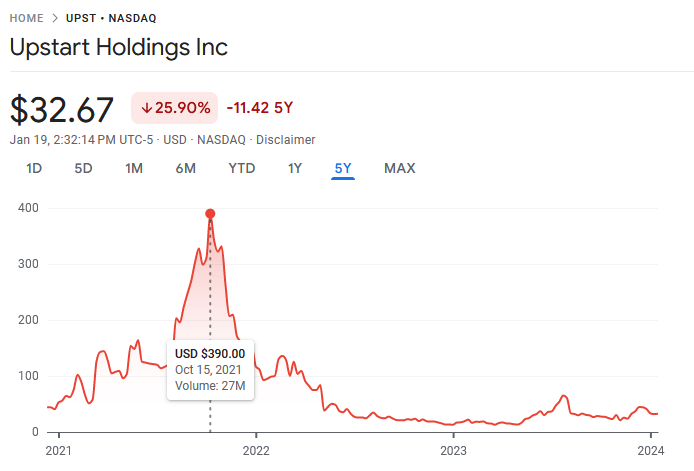TLDR:
- CNBC is financial propaganda designed to further the interests of its owners.
- CNBC is owned by Comcast, which is 88% owned by institutions (Wall Street)
- The owners of CNBC is Wall Street, and what Wall Street wants is more money and power for themselves and less for everybody else.
- When a person watches CNBC, they are consuming information designed to take money out of their pocket and put it into Wall Street’s pocket.
-
The purpose of CNBC (and other financial propaganda outlets) is to help Wall Street get more money and power for themselves and less for everybody else.
I recently saw this post and it made me curious to see how Upstart has fared since that CNBC interview was originally aired.
the original video clip appears to be from an October 15, 2021 CNBC interview with a guest by the name of Mark Minervini.
If you go to that CNBC link to view the clip, you will not find the part where Mark Minervini reveals that he has no idea what Upstart Holdings even does, this part has been conveniently removed.
Wikipedia says: "Upstart is an AI lending platform that partners with banks and credit unions to provide consumer loans using non-traditional variables, such as education and employment, to predict creditworthiness. "
By matter of pure coincidence, October 15, 2021, the same day that the original CNBC interview aired, was also the same day that Upstart Holdings was at an all time high market valuation.

So, recap:
- in late 2020, some company that nobody has ever heard of called Upstart Holdings, ticker UPST, that performs some vague “AI lending platform”, does an IPO
- UPST rises from IPO all the way until October 2021.
- October 15, 2021, wall street finance propaganda channel CNBC gets some stooge to sit in front of a camera and shill for some ticker that he doesn’t even know what it is. "Upstart is up about 25 percent just in four days, that’s a good looking name. Very powerful, very strong earnings, " this is the type of great due diligence that CNBC has to offer here. It’s a great stock because it’s up and up is good. Put your money in now, because stock goes up.
- (the movie The Big Short draws attention to this concept of “Hot Hands” that is a bias that people have: “people think whatever is happening now is going to continue to happen into the future”)
- October 15, 2021, to present: UPST is down more than 90% since CNBC was pumping it.
Who owns CNBC?
CNBC is owned by Comcast, which is 88% owned by institutions (Wall Street)
What is CNBC’s purpose?
The purpose of CNBC is the same purpose any propaganda machine.
Wikipedia provides this handy definition of propaganda, emphasis mine:
Propaganda is communication that is primarily used to influence or persuade an audience to further an agenda, which may not be objective and may be selectively presenting facts to encourage a particular synthesis or perception, or using loaded language to produce an emotional rather than a rational response to the information that is being presented. Propaganda can be found in a wide variety of different contexts.
Propaganda is the art of manipulating the perception of the target audience using a variety of lies, deceptions, and omissions of information.
It has been famously said that all warfare is based on deception.
For example in the context of a war, propaganda can be used to motivate your own troops by selling a perception of strength and success, and it can be used to demoralize your opponent’s troops by selling a perception of weakness and defeat. In war, propaganda is simply a tool used to help the war-interests of the party that is utilizing the propaganda.
It’s the same in the world of finance. Financial propaganda is designed to manipulate perceptions so that the person or party that is doing the manipulating may somehow benefit.
The owner of a propaganda machine like CNBC deploys the art of deception and the outcome is that the audience that consumes it subsequently hands over their hard earned money willingly and places it into the possession of that same propaganda owner.
The victim is led to believe that the information they consumed was a hot tip that might help them make some more money, but of course it was actually just a trap that took their money and gave it to Wall Street in stead.


“What does Upstart… do exactly?”